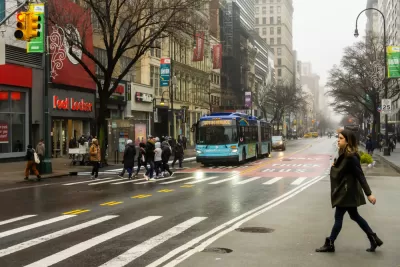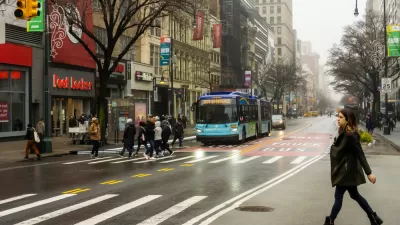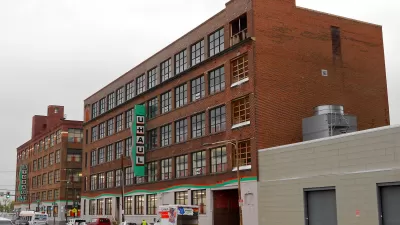A new survey reveals broad support for a less car-centric approach to capital investment in the city of New York.

"New Yorkers want more open streets, bike lanes, and bus lanes, and they’re willing to sacrifice some free parking to get them," reports Christopher Robbins, summarizing data from a recent poll by Siena College, commissioned by Transportation Alternatives.
According to the poll, "68% of registered voters in New York City supported adding more protected bike lanes, while 63% of those polled wanted to expand the city’s Open Streets program in their neighborhoods," according to Robbins.
"A majority of those polled also said they wanted more dedicated bus lanes, wider sidewalks, greenery, and spaces for children to play, even if it means sacrificing parking or space for vehicles."
The article provides breakdowns of the data on demographic lines, including the observation that protected bike lanes had the strongest support from poll respondents making less than $50,000 a year.
Robbins places the report's findings in context of the pandemic, noting the frustration among advocates for traffic safety and public transit that the de Blasio administration hasn't done more to further the city's Vision Zero goals with the Pandemic offering new opportunities for change.
According to Transportation Alternatives's messaging from the results of the survey: planning for non-automotive mobility is good policy and good politics.
FULL STORY: Most NYers Would Trade Free Parking For Safer Streets, Survey Says

Maui's Vacation Rental Debate Turns Ugly
Verbal attacks, misinformation campaigns and fistfights plague a high-stakes debate to convert thousands of vacation rentals into long-term housing.

Planetizen Federal Action Tracker
A weekly monitor of how Trump’s orders and actions are impacting planners and planning in America.

San Francisco Suspends Traffic Calming Amidst Record Deaths
Citing “a challenging fiscal landscape,” the city will cease the program on the heels of 42 traffic deaths, including 24 pedestrians.

Defunct Pittsburgh Power Plant to Become Residential Tower
A decommissioned steam heat plant will be redeveloped into almost 100 affordable housing units.

Trump Prompts Restructuring of Transportation Research Board in “Unprecedented Overreach”
The TRB has eliminated more than half of its committees including those focused on climate, equity, and cities.

Amtrak Rolls Out New Orleans to Alabama “Mardi Gras” Train
The new service will operate morning and evening departures between Mobile and New Orleans.
Urban Design for Planners 1: Software Tools
This six-course series explores essential urban design concepts using open source software and equips planners with the tools they need to participate fully in the urban design process.
Planning for Universal Design
Learn the tools for implementing Universal Design in planning regulations.
Heyer Gruel & Associates PA
JM Goldson LLC
Custer County Colorado
City of Camden Redevelopment Agency
City of Astoria
Transportation Research & Education Center (TREC) at Portland State University
Jefferson Parish Government
Camden Redevelopment Agency
City of Claremont





























